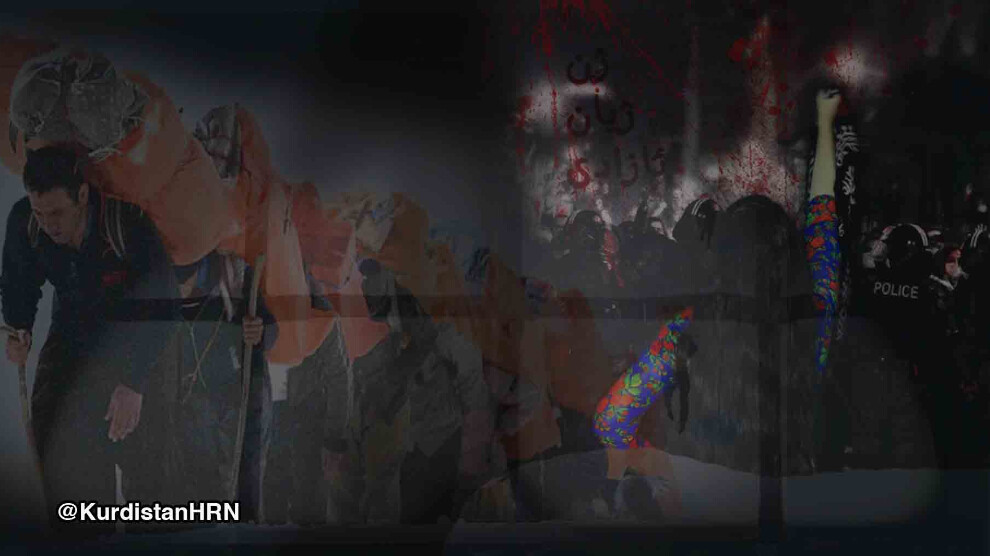KHRN releases report of human rights violations in Rojhilat in October
Human rights violations against Kurdish civilians and activists in the Kurdish region of Iran continued unabated in October 2023.
Human rights violations against Kurdish civilians and activists in the Kurdish region of Iran continued unabated in October 2023.

In its monthly reports, the Kurdistan Human Rights Network (KHRN) highlights cases of human rights violations in Kurdistan and violations of the rights of Kurdish civilians in different regions and cities across Iran. This report includes all cases recorded and reported by KHRN from across Iran through its own sources and verification mechanisms from 1 October to 31 October.
“The restrictive environment for independent human rights organisations in Iran, coupled with the pressures faced by individuals subjected to human rights violations and their families, make it difficult to publish accurate and comprehensive reports,” said KHRN, noting that the statistics and information presented in the report do not cover all cases of human rights violations.
The report is based on a review of news and reports provided by the KHRN and a review of reports from other human rights organisations and news agencies.
Executions
According to KHRN’s findings, Iran executed at least nine prisoners on drug-related charges in the prisons of Hamadan, Rasht, Khorramabad, Karaj and Khoy during the month of October. These are the executions the KHRN has been informed of by its sources. However, the number of those executed is likely to be higher.
Civilian killings
On 28 October, Iranian state news agencies reported that a 16-year-old girl, Armita Geravand, had died after spending 28 days in a coma in the intensive care unit of Tehran’s Fajr Hospital.
Geravand was transferred to a military hospital on 1 October, and numerous news reports stated that she had been physically assaulted by government agents on the Shohada line of the Tehran metro because of her hijab.
According to various reports, Geravand had “no vital signs” from the moment she was admitted to the hospital and remained in a coma throughout her stay.
The British newspaper The Guardian reported on 5 October, citing two eyewitnesses, that Geravand had been subjected to a “physical assault” by a female morality police officer in a metro carriage. According to one witness, the morality police officer ‘violently pushed her’ after an argument.
Additionally, Iranian security forces arrested at least 15 activists and civilians, including Mohammad Geravand, a relative of Armita Geravand, during the teenager’s funeral at the Behesht-e Zahra cemetery in Tehran on 29 October.
Femicide
At least four women have been killed by their male family members in Sardasht, Piranshahr, Bukan and Orumiyeh in the past month.
Kolbars and tradesmen
In October, at least three kolbars were shot dead and 13 others injured by Iranian border guards in the western border areas of the country.
Landmine explosions
On 17 October, Peshawa Aliyar, a civilian from Baneh, was killed by a landmine explosion in Sulaimaniya, Kurdistan Region of Iraq.
Work-related accidents
On 20 October, Martin Hossein-Panahi, a 16-year-old child labourer, was killed in a factory accident in Sanandaj.
Detentions and arrests
Throughout October, Iranian forces arrested at least 29 activists and civilians, at least two of whom were imprisoned.
Prison sentences
Last month, Iranian courts sentenced at least 11 people to prison terms ranging from four months to 10 years.
Also, civilian Gholamreza Rasaei and Kurdish political prisoner Nayeb Askari were sentenced to death.
Askari, who was previously sentenced to death in absentia by Branch Two of the Islamic Revolutionary Court in Orumiyeh, West Azerbaijan Province, on charges of “armed insurrection” through membership of the Kurdistan Free Life Party (PJAK), was sentenced to death again following a retrial request and several in-person court sessions at the same branch.